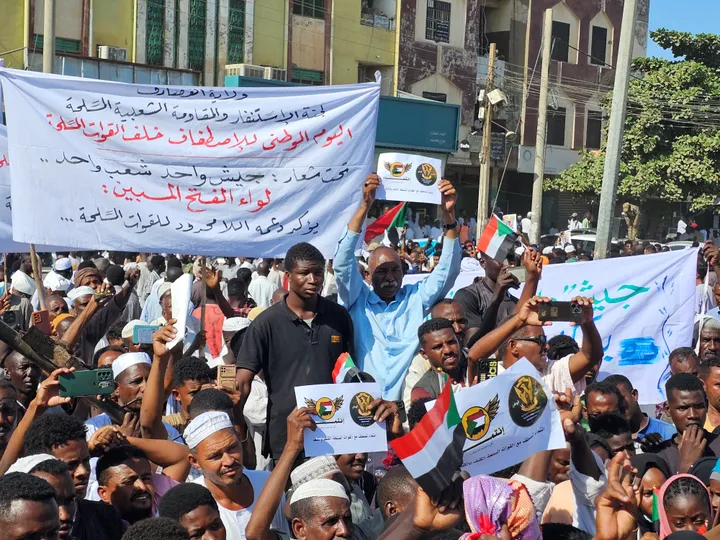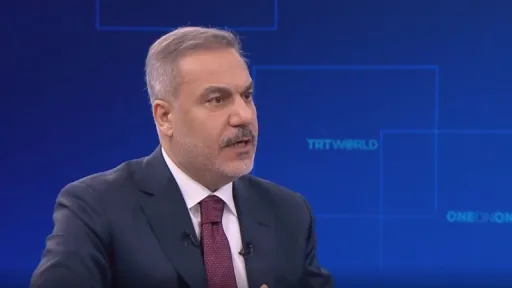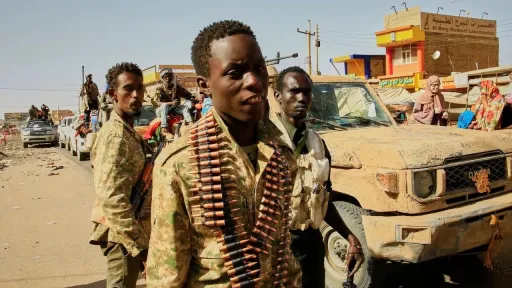By Abdulwasiu Hassan
Imagine having cash in your bank account that you can't physically withdraw beyond a limit unless you pay a commission to an agent to bypass the system.
This is the harsh reality for many Nigerians, especially in rural areas where digital banking services are hard to come by.
"To withdraw 1 million naira (US $641), you have to pay an extra 20,000 naira ($12.8). It's a terrible parallel system that we are stuck in," Adamu Tilde, a businessman in the northeastern Bauchi State, told TRT Afrika.
Adamu, who deals in agricultural produce, requires large amounts of currency as the farmers he does business with accept payments only in cash.
He isn't the only one facing this predicament. Bulk buyers of agricultural produce make large withdrawals during the harvesting season, driving demand for cash and unwittingly allowing agent bankers to exploit the situation.
Nigerians in many other parts of the country face similar challenges when they need to make transactions that require cash.
More than 90% of around 4.55 trillion naira ($2.8 billion) in circulation, is outside the banking system, according to Nigeria's central bank.
The most exasperating part of the situation is the continuation of the crisis despite the volume of cash outside the banking system increasing by 1.59 trillion naira in just the past year.
Echoes from past
Africa's most populous country experienced an acute cash crunch in the run-up to the 2023 election, coinciding with the Central Bank of Nigeria (CBN) embarking on a currency redesign meant to encourage a cashless policy and purportedly combat kidnapping for ransom and corruption.
As part of the transition, Nigerians were asked to deposit their old notes in banks in return for new currency.
In the past, the Central Bank of Nigeria said the cashless policy would ''drive development and modernisation of our payment system'' and ensure ''financial inclusion by providing more efficient transaction options and greater reach.''
It also hoped the measure would ''improve the effectiveness of monetary policy in managing inflation and driving economic growth.''
While the strategy seemed achievable in theory, what the authorities presumably hadn't bargained for was lengthy queues forming at ATMs across the country as people struggled to exchange or withdraw enough cash for their requirements.
Those desperate for cash to settle business or emergency obligations turned to Point of Sale (POS) fintech agents, further pushing up commissions.
The central bank ultimately extended the deadline when old notes would cease to be legal tender after the country's Supreme Court ruled that the exchange window originally fixed for citizens wasn't adequate.
The bank authorities also issued a statement reassuring Nigerians that the old notes were still valid as legal tender.
ATMs run dry
Teller machines in many parts of the country are often empty, leading some people to link the scarcity to the diversion of cash to POS agents.
This was why the central bank issued a directive to banks late last year to ensure that cash is made available to customers over the counter and through ATMs. It warned that failure to adhere to the protocol would invite sanctions.
“Effective December 1, 2024, customers are encouraged to report any difficulties withdrawing cash from bank branches or ATMs directly to the CBN through designated phone numbers and email addresses for their respective states," CBN's governor, Olayemi Cardoso, said.
"Financial institutions found engaging in malpractices or deliberate sabotage will face stringent penalties."
On January 14, CBN slapped cumulative penalties of 1.35 billion naira ($823,170) on nine banks that had flouted its directive to ensure that their ATMs were stocked with cash.
Hakama Sidi Ali, CBN's acting director of corporate communications, says the idea is to ensure compliance and keep the system healthy. "Ensuring seamless cash flow is paramount to maintaining public trust and economic stability."
Not everyone believed much would come of the central bank's tough stance regarding cash liquidity.
"Banks feel that the penalty charges are relatively too small, and that is perhaps why they are limiting the amount of cash they load into ATMs," Dr Usman Bello of the department of economics at Ahmadu Bello University, Zaria, said before the central bank cracked the whip.
Doubts persist about whether the system can be cleansed, given the chaos sparked by the currency redesign crisis not long ago, a situation that made people trust the banking system less.
Some people point to the increasing percentage of currency in circulation outside the banking system as the reason for their cynicism.
Cashless policy
As the central bank works to end the cash crunch, it simultaneously incentivises cashless transactions.
In a circular titled "Cash-out Limits for Agent Banking Transactions" last December, the apex bank placed a 500,000 naira ($320.6) cash-out limit on withdrawals by an individual through all channels within a week.
This is applicable to all retail banks, microfinance banks, mobile money operators and agents.
The objective behind setting the limit is to advance a cashless economy and enhance electronic transfer in agency banking.
According to Dr Bello, this is easier said than done, given the preference for cash among most people in the informal sector, which constitutes the bulk of the Nigerian economy.
"The International Monetary Fund's latest estimation is that the informal sector accounts for 65% to 70% of the Nigerian economy. It means that about 65% of the economic transactions are in cash, not through the banking platform," he told TRT Afrika.
"So, of course, when you limit the availability of cash to the point of sale, the ability of those informal activities, especially exchanges that require liquid cash, becomes more and more difficult."
Aliyu Alfa, an Abuja-based agent banker, corroborates Dr Bello's point, saying the limitation imposed on the amount of cash people can withdraw is not good for his business.
"Take the case of labourers waiting to be paid. Their job may be worth over 500,000 naira. A worker doesn't care about what the bank limit is. What matters to him is to receive the cash he has earned for his labour."
Businessmen like Tilde, who mostly deal with farmers who are unused to complicated bank apps, look forward to the day these stakeholders adopt payment methods as intuitive as mobile phone recharge cards.
Until Nigeria's burgeoning tech sector and the central bank fill the gaps in cash supply or even succeed in deploying easier payment methods that replace the exclusive use of hard currency, undesirable parallel systems will continue to thrive.
➤ Click here to follow our WhatsApp channel for more stories.
























